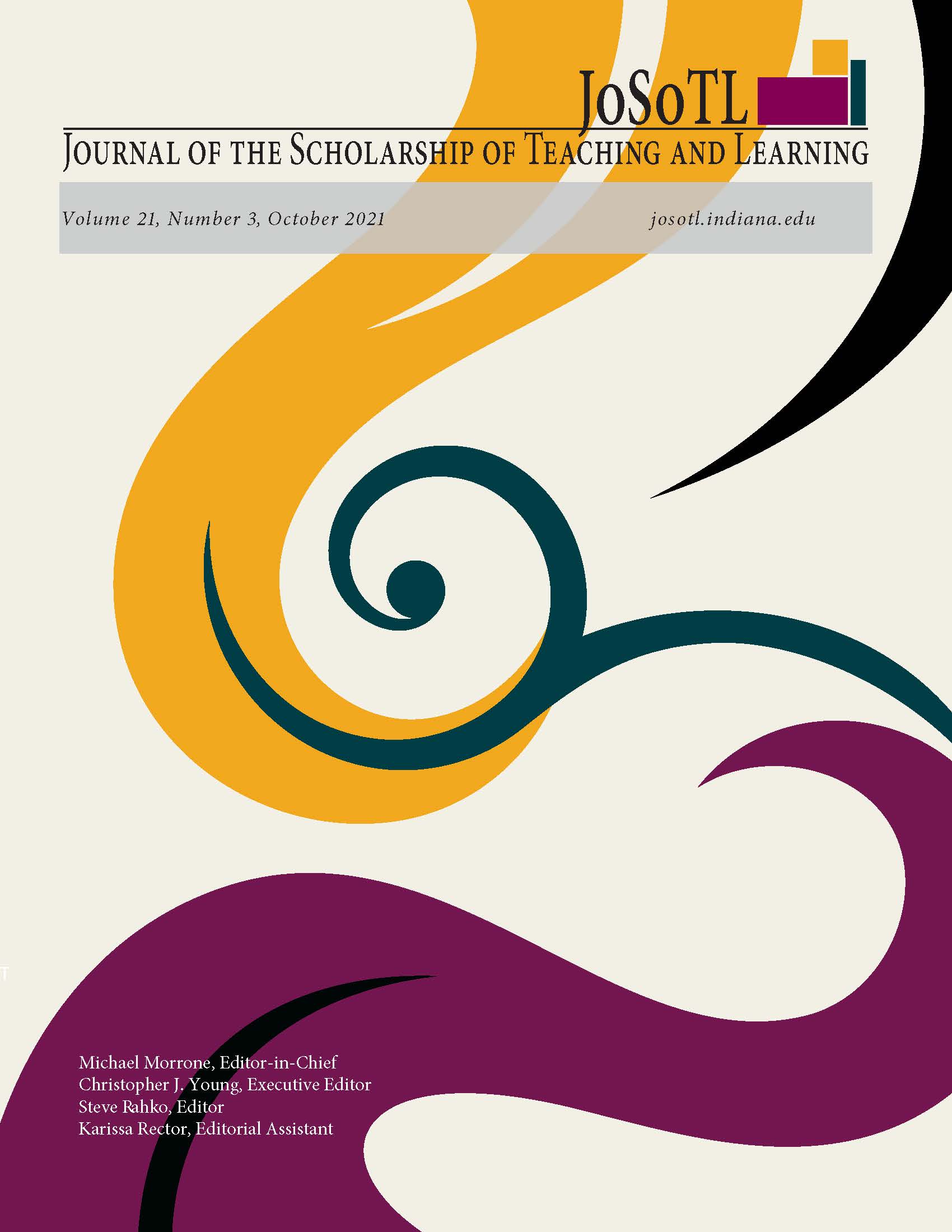The Invitation Circle Creating Space for Decolonizing and Humanizing Inquiry
Main Article Content
Abstract
This article discusses an invitation circle, a process of inviting workshop and classroom participants into collaborative and humanizing inquiry, and provides guidelines for initiating an invitation circle. Drawing from indigenous and posthuman traditions, invitation circles model decolonizing inquiry, encourage participants to develop humanizing connections with one another, and foster imagination of futures unconstrained by the colonial imaginary.
Downloads
Download data is not yet available.
Article Details
How to Cite
Latta, M. (2021). The Invitation Circle: Creating Space for Decolonizing and Humanizing Inquiry. Journal of the Scholarship of Teaching and Learning, 21(3). https://doi.org/10.14434/josotl.v21i3.29542
Section
Quick Hits

This work is licensed under a Creative Commons Attribution 4.0 International License.
- Authors retain copyright and grant the Journal of the Scholarship of Teaching and Learning (JoSoTL) right of first publication with the work simultaneously licensed under a Creative Commons Attribution License, (CC-BY) 4.0 International, allowing others to share the work with proper acknowledgement and citation of the work's authorship and initial publication in the Journal of the Scholarship of Teaching and Learning.
- Authors are able to enter separate, additional contractual agreements for the non-exclusive distribution of the journal's published version of the work (e.g., post it to an institutional repository or publish it in a book), with an acknowledgement of its initial publication in the Journal of the Scholarship of Teaching and Learning.
- In pursuit of manuscripts of the highest quality, multiple opportunities for mentoring, and greater reach and citation of JoSoTL publications, JoSoTL encourages authors to share their drafts to seek feedback from relevant communities unless the manuscript is already under review or in the publication queue after being accepted. In other words, to be eligible for publication in JoSoTL, manuscripts should not be shared publicly (e.g., online), while under review (after being initially submitted, or after being revised and resubmitted for reconsideration), or upon notice of acceptance and before publication. Once published, authors are strongly encouraged to share the published version widely, with an acknowledgement of its initial publication in the Journal of the Scholarship of Teaching and Learning.
References
Goodyear-Ka’opua, N. (2012). Indigenous oceanic futures: Challenging settler colonialisms and militarization. In L. T. Smith, E. Tuck, & K. W. Yang (Eds.), Indigenous and Decolonizing Studies in Education (pp. 82–102). New York: Routledge.
Mignolo, W. D. (2007). Delinking: The rhetoric of modernity, the logic of coloniality and the grammar of de-coloniality. Cultural Studies, 21(2), 449–514. https://doi.org/10.1080/09502380601162647
Paris, D., & Winn, M. (Eds.). (2014). Humanizing research: decolonizing qualitative inquiry with youth and communities. Thousand Oaks, CA: SAGE Publications.
Smith, L. T. (2012). Decolonizing methodologies: Research and indigenous peoples (2nd ed.). New York: Zed Books.
Tuck, E. (2009). Suspending damage: A letter to communities. Harvard Educational Review, 79(3), 409–428. https://doi.org/10.17763/haer.79.3.n0016675661t3n15
Tuck, E., & Yang, K. W. (2012). Decolonization is not a metaphor. Decolonization: Indigeneity, Education, & Society, 1(1), 1–40.
Mignolo, W. D. (2007). Delinking: The rhetoric of modernity, the logic of coloniality and the grammar of de-coloniality. Cultural Studies, 21(2), 449–514. https://doi.org/10.1080/09502380601162647
Paris, D., & Winn, M. (Eds.). (2014). Humanizing research: decolonizing qualitative inquiry with youth and communities. Thousand Oaks, CA: SAGE Publications.
Smith, L. T. (2012). Decolonizing methodologies: Research and indigenous peoples (2nd ed.). New York: Zed Books.
Tuck, E. (2009). Suspending damage: A letter to communities. Harvard Educational Review, 79(3), 409–428. https://doi.org/10.17763/haer.79.3.n0016675661t3n15
Tuck, E., & Yang, K. W. (2012). Decolonization is not a metaphor. Decolonization: Indigeneity, Education, & Society, 1(1), 1–40.
